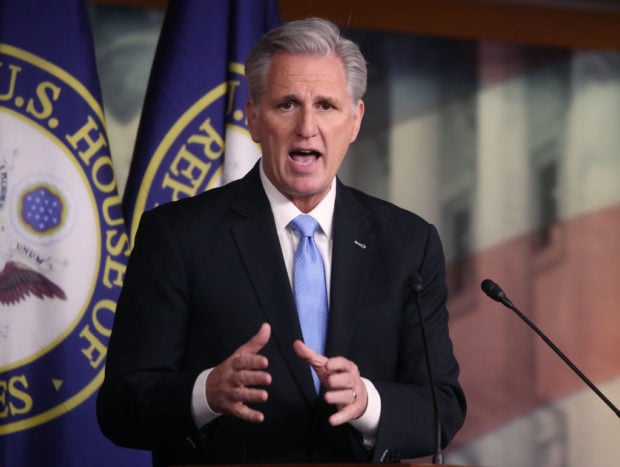In 2011, former President Barack Obama said resolutely that his lawyers were “not persuaded” that taking unilateral authority to raise the debt ceiling is a “winning argument.”
In 2023, it appears President Joe Biden is saying, “Hold my beer (maybe).”
As the debt ceiling default looms overhead, Democrats are encouraging Biden to buck the Constitution and use dictatorial powers to raise the debt ceiling. Citing the 14th Amendment, Democrats such as Rep. Jamie Raskin have called for invoking the amendment “imperative” to get the job done. Washington Democratic Rep. Pramila Jayapal said on CNN Biden should invoke the 14th Amendment to raise the debt ceiling. Independent Vermont Sen. Bernie Sanders also joined the chorus of calls to Biden.
While Biden has acknowledged the possibility, the White House said Wednesday that “at the end of the day, [invoking the 14th Amendment] doesn’t solve the problem that we have now.”

WASHINGTON, DC – FEBRUARY 27: House Minority Leader Kevin McCarthy (R-CA) speaks during his weekly news conference at the U.S. Capitol on February 27, 2020 in Washington, DC. (Photo by Mark Wilson/Getty Images)
But just simply encouraging the reckless invocation of a clause tucked in the 14th Amendment without looking at the historical context of its creation is a grave injustice to not only the separation of powers, but more importantly, the potential unconstitutional abuse of authority.
Questions regarding who has the power to handle the nation’s finances have been long decided. As Alexander Hamilton put so wisely in Federalist 78, the executive branch “holds the sword of the community” while Congress “commands the purse.”
Then there is the 14th Amendment, specifically section 4, which reads:
“The validity of the public debt of the United States, authorized by law, including debts incurred for payment of pensions and bounties for services in suppressing insurrection or rebellion, shall not be questioned. But neither the United States nor any State shall assume or pay any debt or obligation incurred in aid of insurrection or rebellion against the United States, or any claim for the loss of emancipation of any slave; but all such debts, obligations and claims shall be held illegal and void.”
Section 4 was created to ensure that southern states would acknowledge and pay the debts incurred during the war when they technically were not a part of the Union. (RELATED: ‘That’s Not What The Poll Says’: Poppy Harlow Pushes Back Against Jayapal Over Debt Ceiling)
Then Pennsylvania Rep. Samuel J. Randall offered a resolution to the Amendment in 1865 which read “Resolved that, as the sense of this House, the public debt created during the late rebellion was contracted upon the faith and honor of the nation; that it is sacred and inviolate, and must and ought to be paid, principal and interest; that any attempt to repudiate or in any manner to impair or scale the debt shall be universally discountenanced, and promptly rejected by Congress if proposed.”
In fact, concerns that the clause would be misinterpreted and abused were so pertinent that Indiana Senator Thomas Hendricks, speaking in opposition of the clause, said, “The fourth section provides that the public debt shall remain inviolate. Who has asked us to change the Constitution for the benefit of the bondholders? Are they so much more meritorious than all other classes that they must be specially provided for in the Constitution?”
The resolutions underscored the specific purpose of the clause in relation to the Civil War and fears among lawmakers that another rebellion could arise and saddle the nation with more debt. It’s fair to argue the president could invoke this unilateral authority if, for instance, there was another Civil War or some other event that stopped Congress from carrying out its enumerated powers. But that’s simply not the case.
The job could be done if Biden negotiates. Republicans did their constitutional duty and passed legislation to raise the debt ceiling and avoid default while also slashing federal spending. Just because Biden and the Democrats don’t like the proposal doesn’t mean they suddenly have divine authority to bypass the Constitution to placate their political ambitions.


